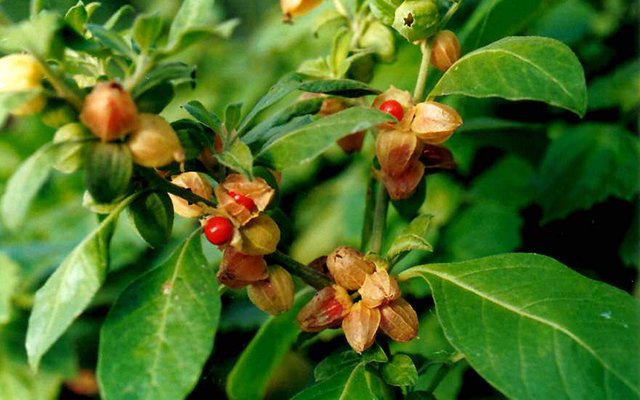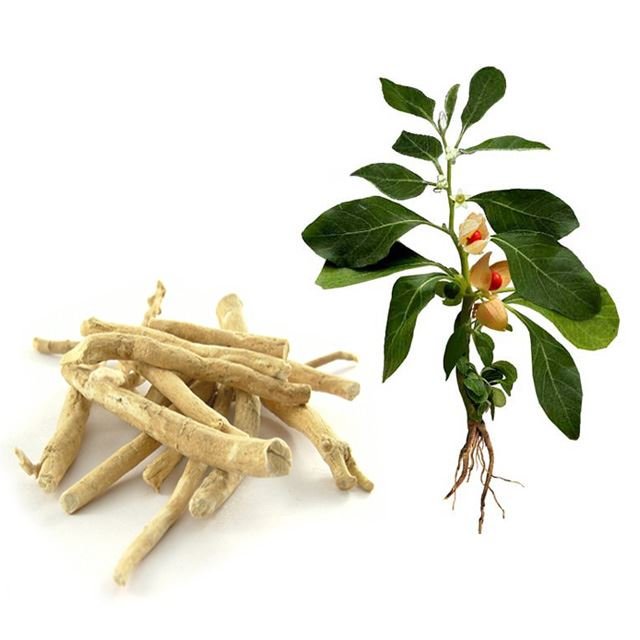ASHWAGANDHA(Withania somnifera) - A Powerful Medicinal Herb and Health benefits
Ashwagandha is extremely powerful herb used as a medicine for thousands of years in ancient Indian medicinal literature. It’s commonly called as ‘adaptogen’ Ashwagandha not only works for physical health but also it has the beneficent role on mental health.

The word "Ashwagandha" is Sanskrit origin which means "smell of the horse urine” which refers to both its unique smell and ability to increase body’s strength. It is also known by several other names, including Indian ginseng and winter cherry etc. a plant in the Solanaceae or nightshade family. The species name somnifera means "sleep-inducing" in Latin.
Withania somnifera is cultivated in many of the drier regions of India like Rajasthan, Madhya Pradesh, Gujarat, Maharashtra, Punjab, Kerala etc. Ashwagandha has a broad spectrum character that has earned it the name 'Indian Ginseng'since it has played a central role in India in a similar fashion as Ginseng has historically in China.
Ashwagandha plant description

Ashwagandha is a small shrub with white or orange flowers with red berries. Ashwagandha is now also grown in North America and other temperate climates as its popularity increases. In western countries, It is actually the plant root and seeds that are used in Ayurveda medicine. The roots of Ashwagandha can occur as one long thick structure. Ashwagandha is also referred to as Winter Cherry. Extracts or powder from the plant's roots or leaves are used to treat a variety of conditions.
Benefits of Ashwagandha
1. Ashwagandha Effects on Brain

Ashwagandha benefits our health in many ways. The plant is believed to improve memory and is highly acclaimed tonic for brain and nervous system in Ayurveda. Researchers have shown that it promotes antioxidant activity that protects nerve cells from harmful free radicals. It is also thought to possess anti-stress properties, a couple of studies suggest Ashwagandha may help alleviate depression and it reduces anxiety. The herb is also considered to be a 'Medhya Rasayana', meaning that it will rejuvenate all three ayurvedic aspects of the mind, namely comprehension, memory, and recollection. As such one of the many favored uses for Ashwagandha in Ayurvedic practice revolves around helping individuals to improve their mental function and power.
In a controlled study, researchers who gave healthy men 500 mg of the herb powder daily reported significant improvements in their reaction time and task performance, compared to men who not received. Some research in this field shows it Ashwagandha may reduce memory and brain function problems caused by injury or disease.
2. Ashwagandha and Cholesterol

Ashwagandha may help to improve heart health by reducing bad cholesterol and triglyceride levels in the blood. So the risk of heart diseases is low in Ashwagandha consuming persons. The group taking the highest dosage of Ashwagandha experienced approximately on an average 18% decrease in LDL cholesterol and 13% decrease in triglycerides
3. Ashwagandha for Inflammation

Ashwagandha supports the immune system and generally aid in optimizing the physiological functions of the body. There is evidence that Ashwagandha has significant anti-inflammatory and anti-tumor properties. It has also been shown to decrease C-reactive protein (CRP) which is markers of inflammation. In one controlled study, the group who took 250 mg of Ashwagandha daily had a 40% average decrease in CRP.
4. Ashwagandha Increase Muscle Mass and Strength

Ashwagandha is well known to bodybuilders because of its muscles building ability. It reduces body fat and increases strength in men. One study's purpose was to determine a safe and effective dosage for Ashwagandha. Healthy men who took 1000 mg per day had gained muscle mass and lost fat after 30 days. It can also boost Testosterone and increase fertility in men by an increase in sperm count and motility.
5. Ashwagandha’s role in cancer

Many studies have found that Ashwagandha helps induce the apoptosis or "programmed cell death" of cancer cells. It also slows down the growth of new cancer cells in several ways. It may be beneficial for treating several types of cancer, including breast, lung, colon, brain and ovarian cancer.
Caution

Generally, Ashwagandha appears to be a safe supplement for most people. However, certain individuals should not take it, including pregnant and breastfeeding women. People with autoimmune diseases should also avoid Ashwagandha unless authorized by a doctor. This includes people with conditions like rheumatoid arthritis, lupus, Hashimoto's thyroiditis and type 1 diabetes.Additionally, those on medication for thyroid disease should be careful when taking Ashwagandha, as it may potentially increase thyroid hormone levels in some people.
thanks for the information
Thank you